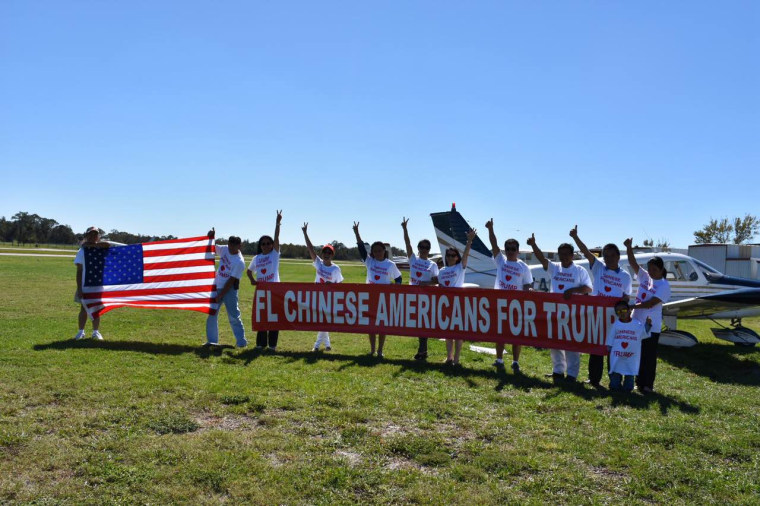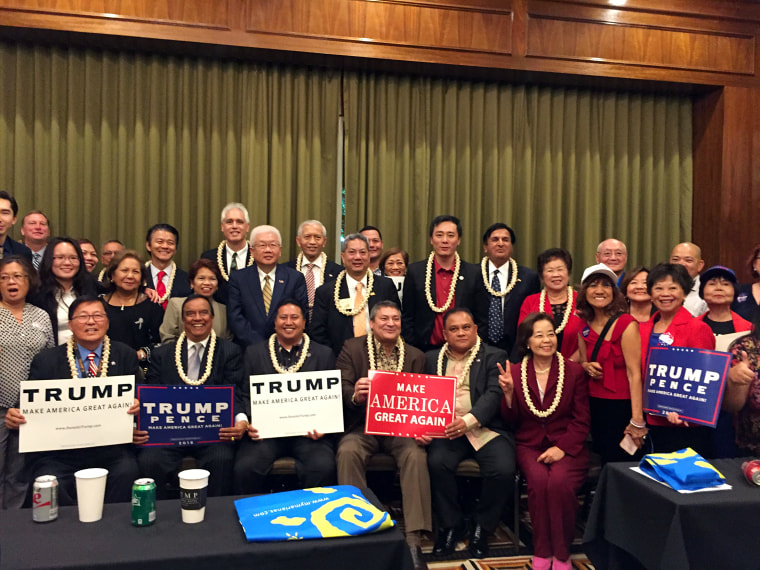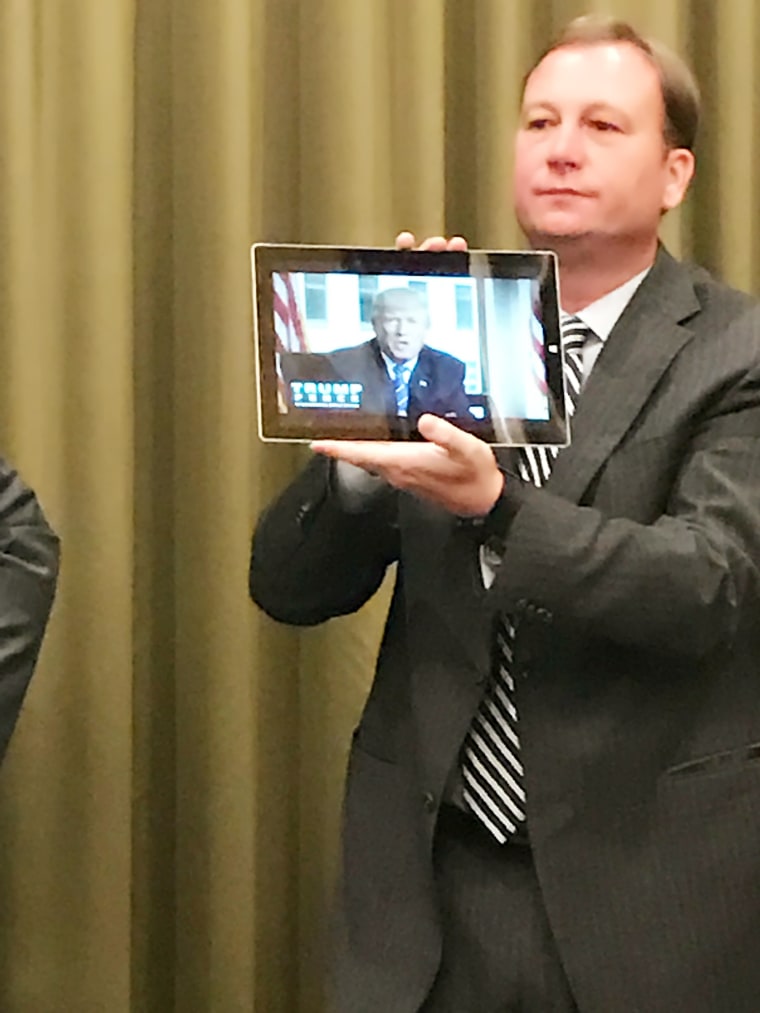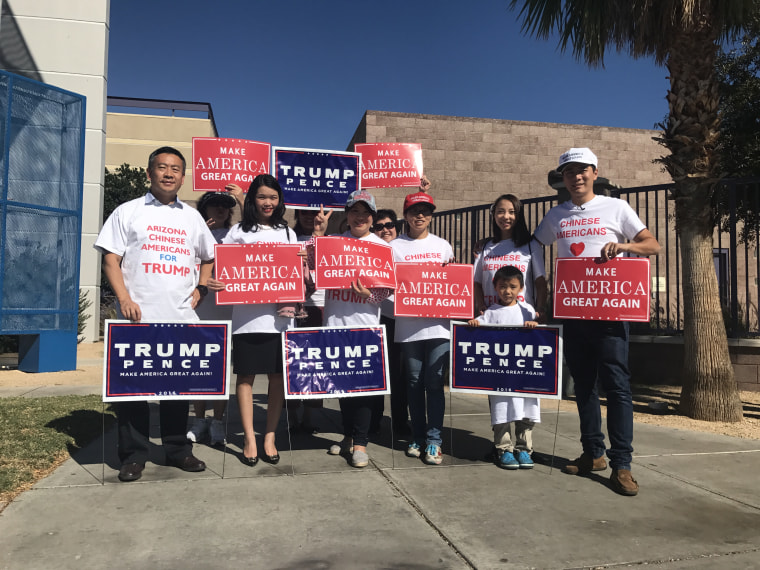Chinese Americans for Trump founder David (Tian) Wang is as pumped for a Donald Trump presidency now as he was when he founded his group a week after the real estate mogul announced his candidacy last year.
He and hundreds of his volunteers have been knocking on doors in battleground states, handing out flyers to seniors at Chinese supermarkets, and sending airplanes into the skies of American cities with banners reading, “Chinese Americans for Trump,” Wang told NBC News.
“I have a direct line to them,” he said of the Trump campaign. “Whatever I need, in terms of materials or whatever, I give them a call, and they give me whatever I want, except money. We pay everything.”

But one source close to Trump’s Asian American and Pacific Islander (AAPI) outreach operation, who spoke to NBC News on condition of anonymity, painted a starkly different picture, calling the campaign’s on-the-ground efforts disorganized, frustrating, and disappointing.
“The biggest problem is the Trump team versus the GOP team,” the source said. “Basically, the GOP team is not enthusiastic, but they have experience, they have connections, they know how to run the ground game. However, the Trump team is very enthusiastic, but they don’t have a strategy.”
RELATED: Asian-American, Pacific Islander Groups Work to Get Out Vote as Election Nears
Behind-the-scenes details of how the Trump campaign and the GOP have been pursuing AAPI support for the Republican nominee are emerging as Trump and Democratic candidate Hillary Clinton head into the final stretch of their campaigns. Trump is trailing Clinton by 41 points among AAPI registered voters, according to a report released in early October.
"With the election just two weeks away, the RNC’s historic ground game for the Republican ticket has created strong enthusiasm from voters, which translates to volunteers engaging voters in AAPI and all communities across the country,” Republican National Committee spokesman Ninio Fetalvo told NBC News in an email.
“I believe this election will come down to thousands of votes in key states. I believe they need to realize that Asian Americans can be that swing vote, to help Donald Trump win those key states.”
The Trump campaign did not immediately respond to an NBC News request for comment.
While Wang spoke of having a pipeline to the Trump campaign, others expressed frustration trying to book Trump surrogates to speak at AAPI rallies in key battleground states, where the demographic could make a difference not only in the presidential race, but also in congressional contests.
“I think the campaign is a little bit overwhelmed because Hillary is a little bit more organized than them,” Herman Martir, an Asian Pacific American Trump committee member, told NBC News.
Martir, president of the Asian Action Network, a nonprofit, said he’s been on the ground for the past week in Virginia, a swing state he’ll be in and out of until Election Day. His organization, he said, has around 6,000 volunteers spread across 15 battleground states conducting Trump outreach.

Martir said he’s asked for surrogates, such as former GOP presidential candidate Ben Carson, but said they’ve been mostly focused on other ethnic groups. He added he felt disappointed about having trouble scheduling such speakers, saying much of the outreach effort has been left up to him and his organization.
“I wish they gave more time to Asian Americans and reached out to us a lot earlier,” Martir said. “That’s the sentiment with a lot of Asian Americans.”
The source who spoke anonymously also said on Friday that requests to the campaign for Trump surrogates went unanswered.
“You need to come in person, or send your surrogates to come in person,” the source said. “You need to look into our eyes and say, ‘I need your help, we can work together, I care about you.’”
While AAPIs make up around five percent of the nation’s electorate, they are the fastest growing racial group in the country. The number of AAPI voters is also expected to double by the year 2040, according to a report last year from the UCLA Study for the Center for Inequality and the Asian Pacific American Institute for Congressional Studies.
RELATED: Asian-American Voters to Double by 2040
Those numbers have motivated both major parties and campaigns to woo the AAPI vote. For the Trump base, many of the members of his APA advisory committee are at the forefront of that effort. Hoping to convince AAPIs that GOP values resonate with those in Asian culture, Trump outreach has been focused not just on registered Republicans, but on the chunk of the AAPI electorate that identifies as non-partisan.
Nearly two in five AAPI registered voters come under that category, according to the Fall 2016 National Asian American Survey.
For Wang, the Chinese Americans for Trump founder, their outreach extends beyond just Asian Americans.
“We’re not just getting AAPIs to vote,” he said. “We’re getting AAPIs to become volunteers so they can make a bigger impact in other aspects.”
“Many of them, after we show them the voter guides, they say, ‘Well, I wish we had this before, because we could have distributed it to many of our members.’"
Wang said those efforts include fanning out across neighborhoods in cities like Las Vegas and Philadelphia to talk to everyone, regardless of race, ethnicity, or political affiliation. That the volunteers are Chinese and they’re supporting Trump can sometimes sway undecideds who aren’t Chinese, he said.
For those pursuing Asian-American voters, challenges still remain. During his week stationed in northern Virginia, Martir said he’s found that many AAPIs, including Filipinos, Koreans and Chinese, are not informed about the issues. The threat of terrorism and the economy, he said, are among the topics concerning them the most.
“Many of them, after we show them the voter guides, they say, ‘Well, I wish we had this before, because we could have distributed it to many of our members,’” he said. “But many of them welcome it. Many of them are glad we’re reaching out to them.”
Martir said he nonetheless remains confident that there’s strong AAPI support for Trump.
But the source unhappy with the Trump campaign’s outreach said the number of AAPIs backing Trump is about the same now as it was when he announced his candidacy. Part of the problem, the source believes, stems from the campaign’s misunderstanding of how to win over first-generation AAPI voters.
It’s an important point, the source said, because 62 percent of AAPI registered voters are foreign born, according to the UCLA Study for the Center for Inequality and the Asian Pacific American Institute for Congressional Studies.
“The people in the GOP, that’s the second generation,” the source said. “Those generations don’t exactly understand the culture and mentality of the first generation.”
RELATED: Clinton Holds 41-Point Lead Over Trump Among Asian-American Voters: Survey
In courting first-generation AAPI voters, the Trump campaign erred by skipping the first stage of outreach, namely motivating AAPIs by having Trump, running-mate Indiana Gov. Mike Pence, or campaign surrogates attend big AAPI rallies, the source said. Instead, the campaign went straight to traditional get-out-the-vote strategies like knocking on their doors, laboring under the assumption that AAPIs were already on board with the Trump and GOP message, according to the source.
The source also said Trump’s outreach to AAPIs is similar to that of African Americans.
“It seems like it’s done not for the sake of a community,” the source said. “It’s for the sake of suburban moms, to show them we’re doing outreach.”
“Same thing here in the Asian community,” the source continued. “You see people wearing [shirts] so they’re very enthusiastic. It’s not really creating [anything] much in our own community. It’s rather to show the PR game outside our community, showing that we’re supporting, which is actually almost like a smoke screen.”

A GOP strategist, who asked not to be named, told NBC News that both major political parties face challenges in dealing with different generations of AAPIs all involved in a campaign.
“Making sure that our activists, our elected officials, and volunteers and supporters, regardless of generation and generational ties, all move in the same direction is a challenge,” the strategist said. “They all have their wants, their needs, and aspects they need to feel empowered to do the job they need to do in order to move the ball forward.”
“For any political apparatus,” the strategist continued, “that’ll always be the challenge when dealing with minority and disparate communities, until there’s a larger share of the pie that they feel comfortable being part of."

The final weeks of Trump’s AAPI outreach come as his Asian Pacific American advisory committee met for the very first time last week in Las Vegas. Neither Trump nor Pence showed up to the gathering. Trump’s coalitions director, Alan Cobb, did attend the meeting, held at the Trump International Hotel a night before the third and final debate.
Wang said Trump sent a welcoming message to attendees in a video that was played on an iPad. He also said he wasn’t disappointed that Trump didn’t drop by. The candidate, he noted, had attended Colorado rallies earlier in the day and was busy preparing for the debate.
Martir, who was also at the meeting, put it differently.
“I’d say not really disappointed — I don’t know how to describe it really — but we were expecting that he would show up, and they told us he would be coming late,” Martir said.
“Some of them were disappointed,” Martir continued. “I could say that, because some of them travelled from other states to meet with him.”
RELATED: Trump Asian Pacific American Committee Holds First Meeting 3 Weeks Before Election
Martir added, however, that he thought it was a good step bringing everyone together.
“But we wanted the campaign to give us more time so that we’d be able to work with [Trump] more effectively,” he said. “I think we expected more, yes. But we didn’t have enough time to discuss a lot of important issues.”
The source who asked not to be named said much of the gathering was spent with 60-to-80 attendees, which included both committee members and guests, explaining why they support Trump.
“That meeting was not supposed to be about what you felt about the campaign,” the source said. “You don’t have to convince us. We’re all Trump supporters. We should have spent that time talking about how to specifically get the Asian community to come out and vote.”
Asked what he would have liked to see the Trump campaign do differently with AAPI voters, Martir said he thought it was important for the campaign to remember that Asian Americans live in battleground states.
“I believe this election will come down to thousands of votes in key states,” he said. “I believe they need to realize that Asian Americans can be that swing vote, to help Donald Trump win those key states.”
Wang described his mission as two-fold. “Our number one priority is to make Trump win — period,” he said. “And our second priority is to promote political awareness among Chinese Americans.”
"Basically, the GOP team is not enthusiastic, but they have experience, they have connections, they know how to run the ground game. ... The Trump team is very enthusiastic, but they don’t have a strategy.”
The source close to the AAPI outreach efforts said, however, that the GOP’s ground game this year was much worse than in years past. The source attributed it primarily to a disconnect between the Trump campaign and the Republican party.
“Trump’s enthusiasm does help a lot of people who are not traditional GOP to come vote and also energize the base,” the source said. “That’s absolutely fantastic.”
But how those efforts will ultimately impact the AAPI community, according to the source, remains unclear.
“When you deal with the Asian community, plan early,” the source said. “Asians hate the fact that when you need me, you come speak to me. That’s why when the politicians at the last moment come to our community, we’re very polite, we’ll listen — but we don’t give a damn because we know you come here for a purpose.”
Follow NBC Asian America on Facebook, Twitter, Instagram, and Tumblr.
